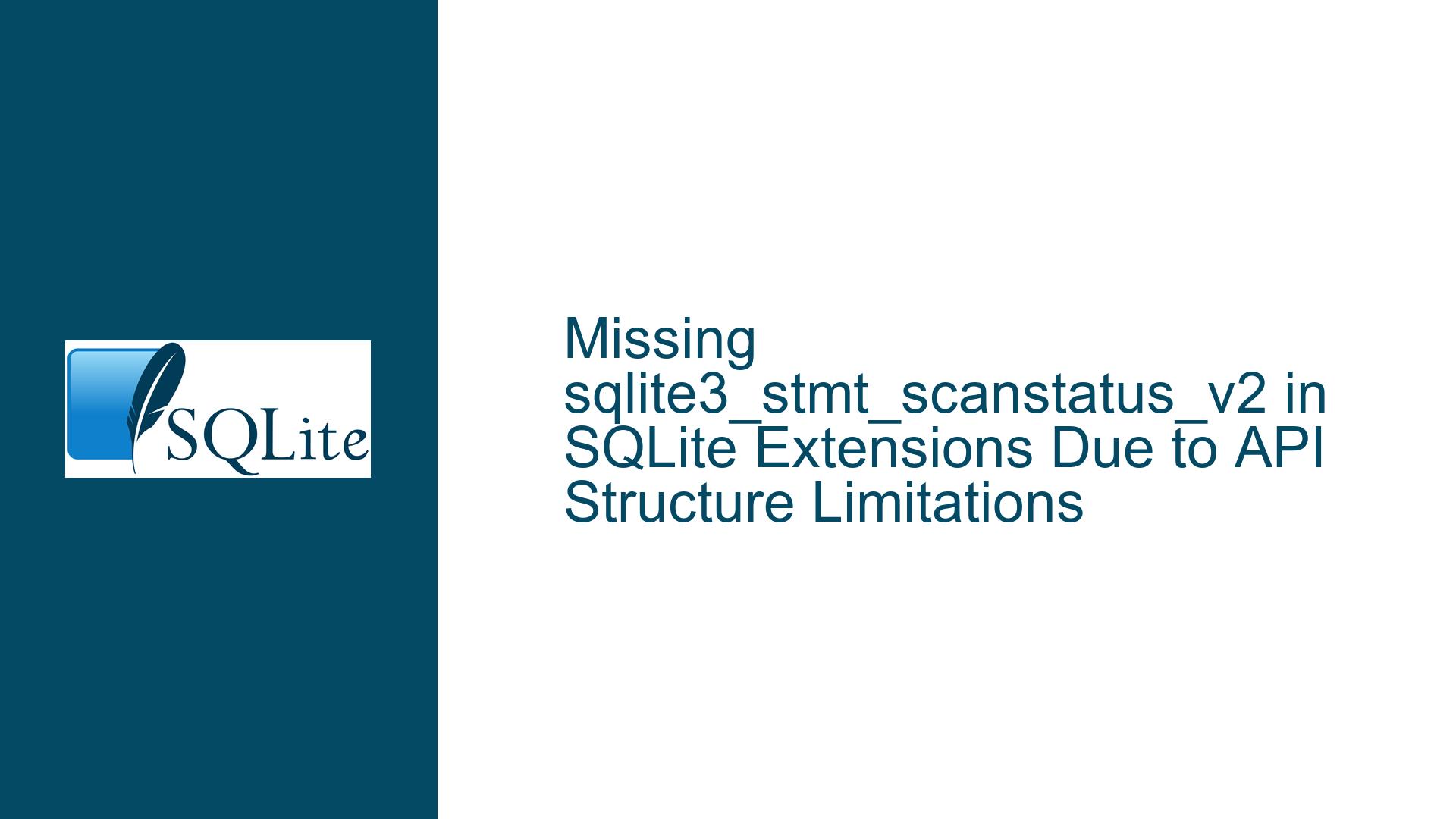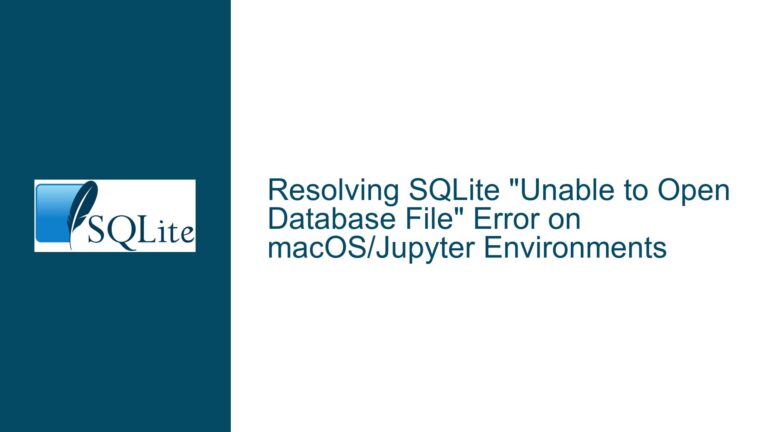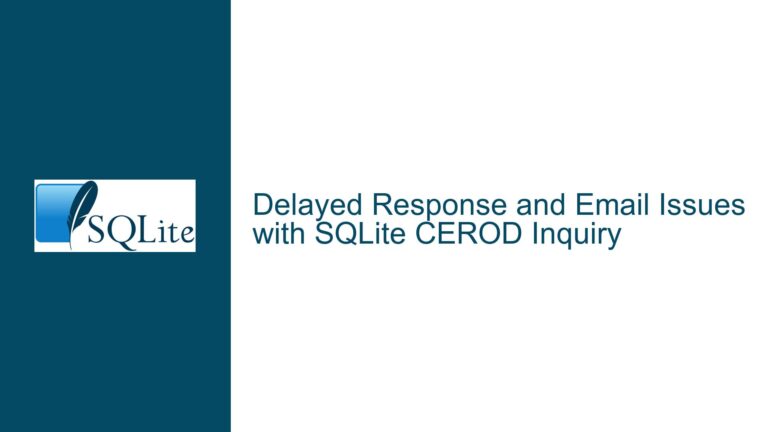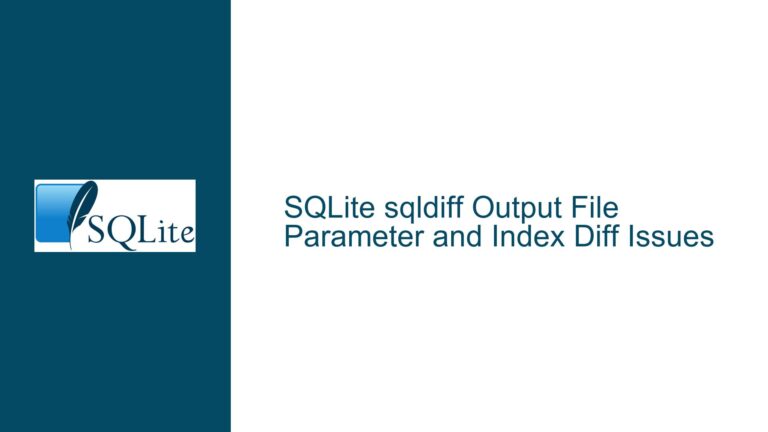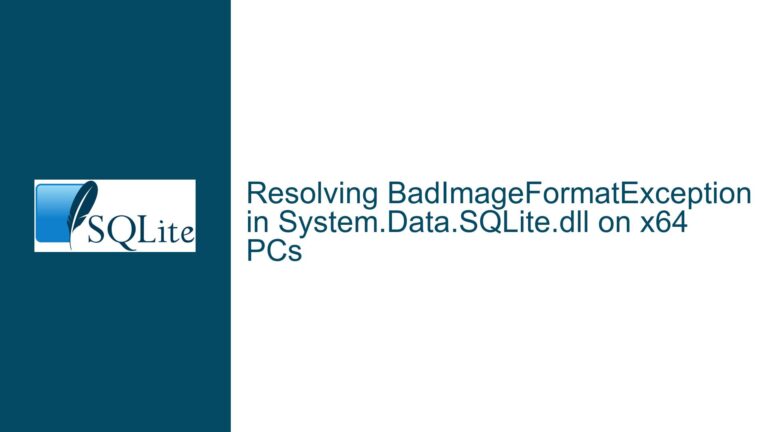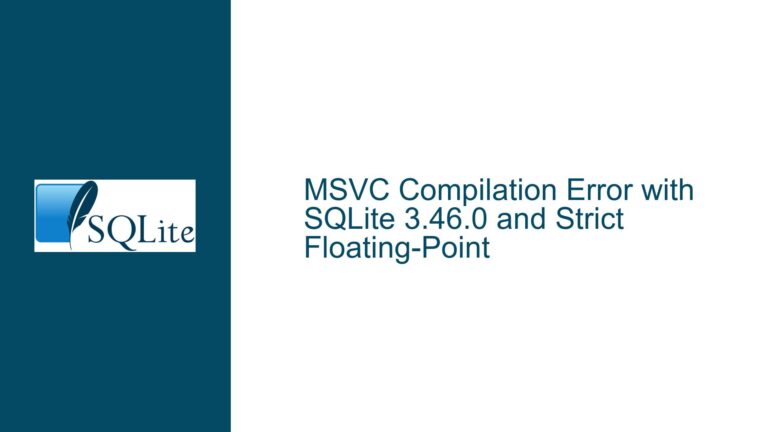Missing sqlite3_stmt_scanstatus_v2 in SQLite Extensions Due to API Structure Limitations
Understanding the Absence of Scan Status Functions in SQLite Extensions
The core issue revolves around the unavailability of sqlite3_stmt_scanstatus and sqlite3_stmt_scanstatus_v2 functions within SQLite extensions. These functions are designed to provide diagnostic information about query execution, such as the number of rows scanned by specific components of a prepared statement. However, extensions cannot directly access them because they are excluded from the sqlite3_api_routines structure defined in sqlite3ext.h. This structure serves as the interface between SQLite core and its extensions, exposing a standardized set of functions for extension developers. The absence of these scan status functions forces developers to rely on workarounds or application-level assistance to access performance metrics, complicating efforts to debug queries executed in temporary in-memory databases or other extension-managed contexts.
The problem is particularly acute for developers building analytical tools, monitoring systems, or performance optimizers that interact with SQLite. Without direct access to these functions, extensions cannot independently instrument query execution or gather granular statistics about scan operations. This creates a dependency on the hosting application to proxy these function calls or expose them through alternative channels. The impact is twofold: it increases the complexity of extension development and limits the portability of extensions across applications that may not provide such workarounds. Furthermore, the functions’ exclusion contradicts the pattern seen with other SQLite APIs (e.g., mutex functions), which remain part of sqlite3_api_routines even when their implementation is conditionally disabled (e.g., under SQLITE_THREADSAFE=0).
Architectural and Design Constraints Behind Omitted Functions
The root cause of this issue lies in SQLite’s architectural design and versioning practices. The sqlite3_api_routines structure acts as a versioned Application Binary Interface (ABI) between the SQLite core and extensions. Functions are added to this structure only when they are deemed stable and universally applicable across configurations. The scan status functions, introduced in SQLite version 3.20.0 (2017-08-01), were likely excluded due to their specialized diagnostic nature and potential dependencies on internal implementation details that might change between releases. Including them in the ABI would commit SQLite to maintaining backward compatibility for these functions, limiting future flexibility in modifying their behavior or underlying data structures.
Another factor is the conditional compilation of SQLite features. Functions like sqlite3_mutex_alloc appear in sqlite3_api_routines even when the library is compiled without thread safety (SQLITE_THREADSAFE=0), where they become no-op stubs. This design ensures ABI consistency regardless of configuration flags. In contrast, the scan status functions are guarded by the SQLITE_ENABLE_STMT_SCANSTATUS compile-time option, which is not enabled by default. Their exclusion from sqlite3_api_routines may reflect an assumption that they are niche tools used only in specific debugging scenarios, rather than general-purpose APIs. This creates a mismatch between the availability of the functions in the core library and their accessibility via the extensions interface.
A deeper technical constraint involves memory management and pointer stability. The sqlite3_api_routines structure is initialized once during extension loading, and its layout must remain consistent across SQLite versions to prevent extensions from referencing invalid memory addresses. Adding new functions to this structure requires careful versioning to avoid breaking existing extensions. The scan status functions, especially sqlite3_stmt_scanstatus_v2 (which includes additional parameters for advanced diagnostics), may have been introduced after the ABI version stabilized, leaving them outside the scope of the current sqlite3_api_routines definition.
Strategies for Accessing Scan Status Functions in Extensions
To resolve this limitation, developers can employ a combination of code modifications, runtime workarounds, and engagement with the SQLite community. The optimal approach depends on whether the goal is to modify the SQLite codebase itself or to work within its existing constraints.
1. Modifying SQLite Core to Include Scan Status Functions in the API Routines
This involves editing the sqlite3ext.h header to add sqlite3_stmt_scanstatus and sqlite3_stmt_scanstatus_v2 to the sqlite3_api_routines structure. Developers must:
- Locate the
sqlite3_api_routinesstruct definition and insert the function pointers:struct sqlite3_api_routines { // ... existing entries ... int (*stmt_scanstatus)(sqlite3_stmt*, int, int, int*, void*); int (*stmt_scanstatus_v2)(sqlite3_stmt*, int, int, int, void*); }; - Update the
sqlite3_extension_initfunction to assign these pointers from the core library’s implementation. - Recompile SQLite with
SQLITE_ENABLE_STMT_SCANSTATUSenabled.
This approach guarantees direct access but requires maintaining a custom SQLite build, which may complicate deployment and future upgrades.
2. Runtime Dynamic Linking via Application Cooperation
Extensions can retrieve the function pointers at runtime if the hosting application exposes them. This requires:
- The application to export the functions using platform-specific symbol export mechanisms (e.g.,
dlsymon Unix-like systems orGetProcAddresson Windows). - A shared interface between the application and extension to exchange pointers. For example:
// In the application: void register_scanstatus_functions( int (*scanstatus)(sqlite3_stmt*, int, int, int*, void*), int (*scanstatus_v2)(sqlite3_stmt*, int, int, int, void*) ) { g_scanstatus = scanstatus; g_scanstatus_v2 = scanstatus_v2; } // In the extension: extern int (*g_scanstatus)(sqlite3_stmt*, int, int, int*, void*); extern int (*g_scanstatus_v2)(sqlite3_stmt*, int, int, int, void*); void sqlite3_extension_init( sqlite3 *db, char **pzErrMsg, const sqlite3_api_routines *pApi ) { SQLITE_EXTENSION_INIT2(pApi); // Request pointers from the application via a custom API } - Ensuring the application links against a SQLite build with
SQLITE_ENABLE_STMT_SCANSTATUS.
3. Leveraging SQLite’s Prepared Statement Lifecycle Hooks
As an alternative to direct function calls, extensions can intercept query execution phases using sqlite3_trace_v2 or sqlite3_profile to collect approximate metrics. While this does not provide the same granularity as scan status functions, it allows inferring scan behavior through timing and resource usage patterns. For example:
sqlite3_profile(db, [](void *ctx, const char *sql, sqlite3_uint64 ns) {
// Analyze query duration and correlate with known scan patterns
}, nullptr);
4. Advocacy for Upstream Changes
Engaging with the SQLite development team to propose including the scan status functions in future versions of sqlite3_api_routines is a long-term solution. This would involve:
- Submitting a patch to the SQLite Fossil repository that adds the functions to the ABI.
- Demonstrating compelling use cases, such as the need for portable debugging extensions.
- Addressing potential concerns about ABI stability by proposing versioned additions (e.g., a new
sqlite3_api_routines_v2structure).
By combining these strategies, developers can mitigate the immediate limitations while advocating for a more permanent resolution. Each approach balances trade-offs between code portability, maintenance overhead, and diagnostic capability, allowing extensions to adapt to their specific deployment constraints.
